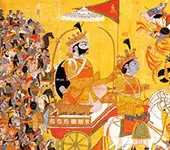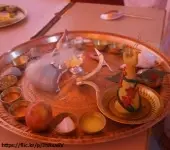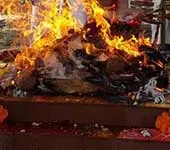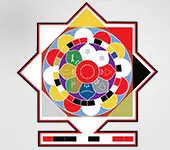Who Narrated Mahabharata?
Mahabharata was narrated by Ugrashrava Souti to Rishis at Naimisharanya. This was a retelling of Vaishampayana's narration at the venue of Sarpa Yajna.
Transcript
(Click here to read more)
Astika Parva of Mahabharata gives a great lesson that Brahmins should be protectors of all beings. It is the duty of the Kshatriya to punish the wicked. Here, we are seeing the narration of Mahabharata by Ugrashrava Sauti at Naimisharanya. Ugrashrava is retelling the Mahabharata as he had heard it at the venue of the Sarpa yajna of Janamejaya. Mahabharata was originally told by Sage Vyasa's shishya, Vaisampayana at the venue of the Sarpa yajna under the instruction of Vyasa. When big yajnas take place, during the day there are long intervals. It is n....
Transcript
(Click here)
Astika Parva of Mahabharata gives a great lesson that Brahmins should be protectors of all beings.
It is the duty of the Kshatriya to punish the wicked.
Here, we are seeing the narration of Mahabharata by Ugrashrava Sauti at Naimisharanya.
Ugrashrava is retelling the Mahabharata as he had heard it at the venue of the Sarpa yajna of Janamejaya.
Mahabharata was originally told by Sage Vyasa's shishya, Vaisampayana at the venue of the Sarpa yajna under the instruction of Vyasa.
When big yajnas take place, during the day there are long intervals.
It is not that the yajna goes on from morning to evening.
It is during such intervals that Puranas and Itihasas are narrated.
There could be many narrators present.
They could be narrating different stories to different audiences.
When Sarpa yajna was going on, Vyasa Maharshi came to the venue along with his disciples.
Vyasa's real name was Krishna Dvaipayana - the dark-complexioned one who was born on an island.
The name refers to the typical circumstances of his birth.
Vyasa's mother Satyavati was taking Sage Parashara across the river in a boat.
Their union happened on an island in the middle of the river.
Satyavati completed her pregnancy instantly and delivered a baby boy on the island itself.
Another interesting point is that Satyavati remained a virgin even after this.
Vyasa was an amshavatara of Mahavishnu.
As soon as he was born, he grew into an adult.
Knowledge of Vedas and shastras came to him on their own.
He didn't go to a gurukul the traditional way.
He had complete knowledge of both Yajna Vidya and Brahma Vidya, of both Parabrahma and Avarabrahma, of both the world and the supreme.
Vyasa divided the single Vedic corpus into four parts as Rigveda, Yajurveda, Samaveda, and Atharva Veda to facilitate their learning and continued performance of yajnas even during Kaliyuga.
Vyasa was the biological grandfather of both Pandavas and Kauravas.
Janamejaya was a descendant of the Pandavas.
Vyasa's son was Pandu.
Pandu's sons are Pandavas.
Arjuna's son was Abhimanyu
Abhimanyu's son was Parikshit
Parikshit's son is Janamejaya.
As soon as Vyasa arrived at the Yajna Vedi, Janamejaya got up and welcomed him with all due respect.
He was offered a golden seat and worshiped with padya, arghya, achamaneeya following the procedure of the shodashopachara puja.
Vyasa also enquired about the well-being of all.
Then Janamejaya asked Vyasa:
You have seen both the Pandavas and Kauravas yourself.
They were both famous for their aklishta karma.
Aklishta karma means karma performed without klesha, emotions such as passion, hate.
Both of them had dispassion.
This is Janamejaya's impression.
Even about the Kauravas, he is saying this.
Then how did enmity rise between them?
We want to hear from you.
The reason can't be anything other than destiny.
Their own past karma.
Which made to fill their minds with enmity towards each other and made them fight each other and destroy each other.
Vyasa instructed his shishya Vaisampayana.
Whatever you have learned from me about the history of the Kuru vamsha, now you narrate to them.
To Janamejaya and all those present here.
So this is the original narration of Mahabharata on earth, on earth because Mahabharata is narrated in other worlds also, Swargaloka, Gandharvaloka, Pitruloka.
Hereafter you will see a lot of Vaisampayana uvacha, Vaisampayana said, because he is the narrator.
These are words of Ugrashrava, Vaisampayana said like this, there at the venue of Sarpa yajna.
This he is telling to the Rishis of Naimisharanya.
Mahabharata was originally told by Vaisampayana and retold by Ugrashrava Sauti.

English Topics
Mahabharatam
Click on any topic to open
- 95 What is behind Calling the Five Brothers the Pandavas
- 94 Give up an Individual IF....
- 93 Fascinating Birth Story of the Kauravas
- 92 Overcoming Grief - Lessons from King Senajit's story
- 91 Yayati's Wisdom
- 90 Yayati's Story
- 89 Brahmacharis Can Bless And Curse
- 88 Human Nature - Comples Mix Of Good And Bad
- 87 Results Of Good Karma
- 86 What Gives Results - Luck or Effort?
Please wait while the audio list loads..
30
Ganapathy
Shiva
Hanuman
Devi
Vishnu Sahasranama
Mahabharatam
Practical Wisdom
Yoga Vasishta
Vedas
Rituals
Rare Topics
Devi Mahatmyam
Glory of Venkatesha
Shani Mahatmya
Story of Sri Yantra
Rudram Explained
Atharva Sheersha
Sri Suktam
Kathopanishad
Ramayana
Mystique
Mantra Shastra
Bharat Matha
Bhagavatam
Astrology
Temples
Spiritual books
Purana Stories
Festivals
Sages and Saints



